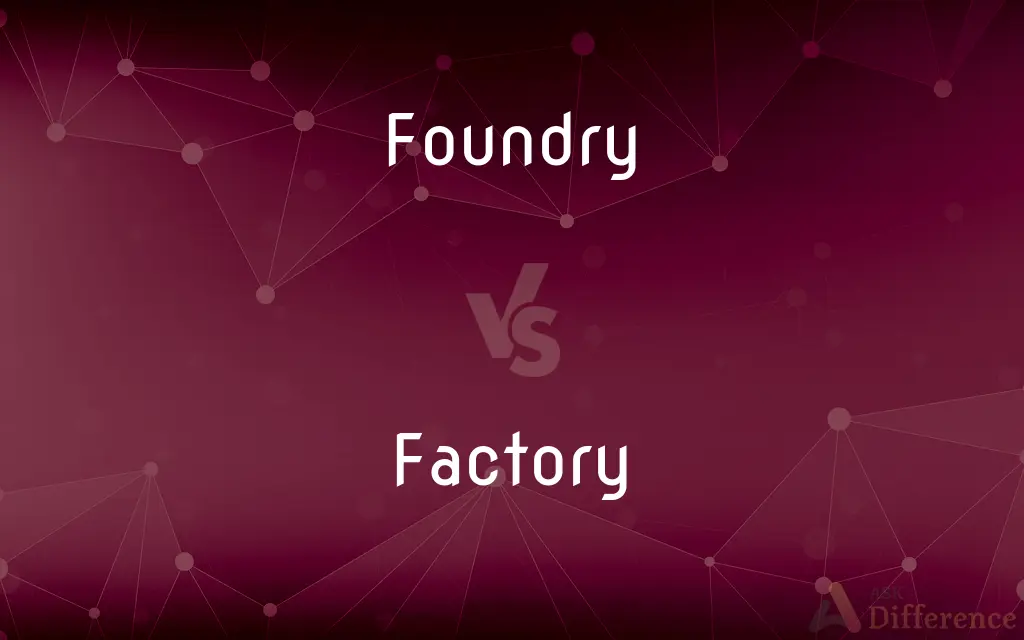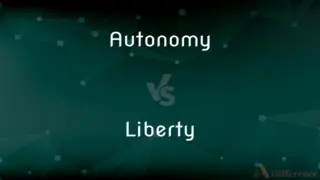Foundry vs. Factory — What's the Difference?
By Tayyaba Rehman & Urooj Arif — Updated on May 3, 2024
A foundry is a specialized facility for casting metals, while a factory is a broader term for any industrial site producing goods through assembly or manufacturing processes.

Difference Between Foundry and Factory
Table of Contents
ADVERTISEMENT
Key Differences
Foundries are specifically designed for melting and casting metal into shapes using molds, essential in creating complex metal components. On the other hand, factories can encompass a wide range of activities, not limited to metalwork, including manufacturing products like textiles, electronics, and food.
While foundries focus primarily on metal casting processes such as sand casting, investment casting, or die casting, factories may involve various manufacturing processes like assembly lines, machining, or even continuous production methods. This versatility makes factories integral to multiple industries.
In terms of environmental impact, foundries often deal with specific challenges such as managing high temperatures and controlling emissions from molten metals. Conversely, factories must address broader issues depending on their production type, including waste management, emissions, and energy use.
Foundries require specialized equipment and facilities to handle the extreme conditions needed for metal casting, including furnaces and mold-making machinery. Factories, however, are outfitted with diverse machinery tailored to their specific manufacturing needs, whether that involves robotics, assembly lines, or processing equipment.
Comparison Chart
Specialization
Metal casting.
Broad manufacturing of various products.
ADVERTISEMENT
Processes
Involves melting metal and pouring into molds.
May include assembly, processing, and machining.
Products
Produces metal parts and components.
Produces a wide range of goods, from electronics to clothing.
Equipment
Specialized for handling and casting molten metals.
Diverse, depending on the product being manufactured.
Environmental Impact
High temperatures, emissions from molten metals.
Varies widely by industry; includes waste, emissions, energy use.
Compare with Definitions
Foundry
Focuses on metal-based production.
The foundry has been a crucial supplier to the automotive industry.
Factory
May use automation and robotics.
The factory implemented robotics to boost its output.
Foundry
Uses furnaces and large molds.
The foundry upgraded its furnaces to increase production.
Factory
Produces finished goods on a large scale.
The clothing factory distributes products worldwide.
Foundry
Specializes in metal melting and mold casting.
Aluminum car parts are typically made in a foundry.
Factory
A building or set of buildings where goods are manufactured.
The factory produces a wide range of electronic devices.
Foundry
Deals with extreme temperatures.
Foundry workers wear protective gear due to the heat.
Factory
Handles different types of materials.
The factory processes both synthetic and natural fibers.
Foundry
A workshop or factory for casting metal.
The foundry produced cast iron components for machinery.
Factory
Can involve diverse manufacturing processes.
The factory uses an assembly line for efficient production.
Foundry
A foundry is a factory that produces metal castings. Metals are cast into shapes by melting them into a liquid, pouring the metal into a mold, and removing the mold material after the metal has solidified as it cools.
Factory
A factory, manufacturing plant or a production plant is an industrial site, often a complex consisting of several buildings filled with machinery, where workers manufacture items or operate machines which process each item into another. They are a critical part of modern economic production, with the majority of the world's goods being created or processed within factories.
Foundry
An establishment where metal objects are made by melting metal and pouring it into molds.
Factory
A building or group of buildings in which goods are manufactured; a plant.
Foundry
The skill or operation of founding.
Factory
See factory ship.
Foundry
The castings made by founding.
Factory
A business establishment for commercial agents or factors in a foreign country.
Foundry
A facility that melts metals in special furnaces and pours the molten metal into molds to make products. Foundries are usually specified according to the type of metal dealt with: iron foundry, brass foundry, etc.
Factory
The source of prolific production
A rock group that was a hit-tune factory.
A motel that served as an illegal drug factory.
Foundry
The act, process, or art of casting metals; founding.
Factory
The position or state of being a factor.
Foundry
A plant that produces chips out of semiconductors in the microelectronics industry.
Factory
A trading establishment, especially set up by merchants working in a foreign country.
Foundry
The act, process, or art of casting metals.
Factory
A building or other place where manufacturing takes place.
History has shown that, even without cheap labor, factories run perfectly well.
Foundry
The buildings and works for casting metals.
Factory
A police station.
Foundry
Factory where metal castings are produced
Factory
A device or process that produces or manufactures something.
Factory
A factory farm.
Chicken factory; pig factory
Factory
(programming) In a computer program or library, a function, method, etc. which creates an object.
Factory
Having come from the factory in the state it is currently in; original, stock.
See how there's another layer of metal there? That's not factory.
Factory
A house or place where factors, or commercial agents, reside, to transact business for their employers.
Factory
The body of factors in any place; as, a chaplain to a British factory.
Factory
A building, or collection of buildings, appropriated to the manufacture of goods; the place where workmen are employed in fabricating goods, wares, or utensils; a manufactory; as, a cotton factory.
Factory
A plant consisting of buildings with facilities for manufacturing
Common Curiosities
How do foundries differ from other manufacturing facilities?
Foundries specialize in metal casting, unlike other facilities that might focus on assembly or various manufacturing processes.
What is a factory?
A factory is an industrial site where goods are manufactured or processed.
Why is environmental management important in foundries?
Due to high temperatures and metal emissions, effective environmental management is crucial in foundries to mitigate impact.
What are common features of a factory?
Factories may feature assembly lines, various processing equipment, and can handle diverse materials.
Are all factories large in size?
Factories vary in size from small workshops to massive industrial complexes, depending on the scale of production.
What is a foundry?
A foundry is a facility where metals are melted and cast into shapes using molds.
Can a foundry be considered a type of factory?
Yes, a foundry is a specialized type of factory focused specifically on metal casting.
What kinds of products are typically made in a foundry?
Foundries produce metal parts like automotive components, machinery parts, and construction materials.
What role do factories play in the economy?
Factories are central to industrial production and often drive the economic sectors of manufacturing worldwide.
How do foundries manage waste and emissions?
Foundries implement measures like filtration systems and energy-efficient furnaces to manage waste and reduce emissions.
Share Your Discovery

Previous Comparison
Autonomy vs. Liberty
Next Comparison
Eskimo vs. AleutAuthor Spotlight
Written by
Tayyaba RehmanTayyaba Rehman is a distinguished writer, currently serving as a primary contributor to askdifference.com. As a researcher in semantics and etymology, Tayyaba's passion for the complexity of languages and their distinctions has found a perfect home on the platform. Tayyaba delves into the intricacies of language, distinguishing between commonly confused words and phrases, thereby providing clarity for readers worldwide.
Co-written by
Urooj ArifUrooj is a skilled content writer at Ask Difference, known for her exceptional ability to simplify complex topics into engaging and informative content. With a passion for research and a flair for clear, concise writing, she consistently delivers articles that resonate with our diverse audience.
















































